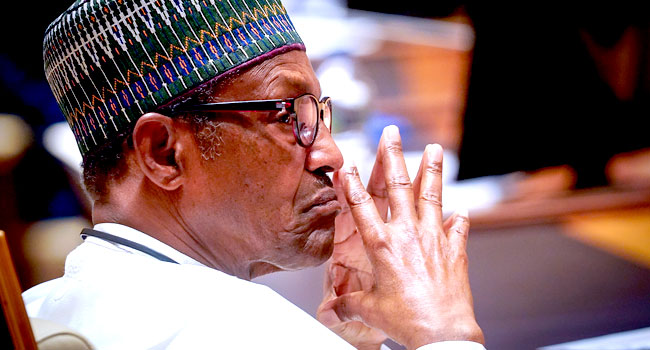Nigeria’s unemployment crisis
Barely two months to the exit of President Muhammadu Buhari’s 8-year administration, the stark reality of its inability to implement strategies to realize the contents of its campaign rhetoric has continued to unravel. Among the selling points of the administration’s campaign was the promise to deflate the alarming rate of youth unemployment and pernicious poverty. […]

President Muhammadu Buhari
Barely two months to the exit of President Muhammadu Buhari’s 8-year administration, the stark reality of its inability to implement strategies to realize the contents of its campaign rhetoric has continued to unravel. Among the selling points of the administration’s campaign was the promise to deflate the alarming rate of youth unemployment and pernicious poverty. But at the twilight of the administration, a report released last week by the financial consulting firm KPMG, projects that unemployment, for working-age Nigerians would rise to about 41 per cent in 2023.
In 2015, when the Buhari government took over from the previous administration, the unemployment rate within that age bracket was 14.9 per cent. Before the KPMG report, the National Bureau of Statistics (NBS) had in 2020 put the country’s unemployment rate at 33.3 per cent, indicating that things are getting worse now. The NBS has not released an updated unemployment rate since then, though late last year, it said some 133 million Nigerians are trapped in multi-dimensional poverty.
It is true that the economic fortunes of the Nigeria Buhari took over were already in a bad shape. Crude oil prices—the major determinant of economic growth in Nigeria—had continued to soar for much of the previous 15 years before 2015. In the four-year period between 2011 and 2014, for example, oil prices averaged $104 per barrel per day throughout, according to the global database, Statista. By 2016, Buhari’s first full year in office, prices were down to $40, pushing the economy into a recession that year. Add to this, the economic effects of the global COVID-19 public health crisis and the still-ongoing Russia-Ukraine war. No doubt, the combined effects of these would challenge the economic fortunes of any country, as indeed they have done all around the world.
Still, governments are not elected to find excuses in challenges, but to solve them. And indeed, in 2015, when oil prices had already slumped, President Buhari promised in his inauguration speech that: “Unemployment, notably youth unemployment, features strongly in our party’s manifesto. We intend to attack the problem frontally through the revival of agriculture, solid minerals and mining, as well as credit to small and medium-size businesses to kick-start these enterprises.” His minister of Information and Culture, Alhaji Lai Mohammed, went further by pledging to create “three million new jobs a year through public works programmes”, and to employ “at least an extra 100,000 police officers”, and so on.
Over the last eight years, not enough actions were taken to match these promises. Apart from its reluctance to hire young Nigerians to join the military and paramilitary, the government’s perennial embargo on unemployment at national and sub-national levels is akin to shooting itself in the foot. This has created opportunities for ‘midnight’ staff recruitment, increasing the number of ghost workers, and for fraudsters to sell jobs at outrageous costs to desperate and mostly unqualified candidates or to candidates with “long-legs” for free.
In many developed societies, one of the strategies governments adopt to tackle poverty and lubricate the economy is to mop up youths from the streets, giving them jobs that would enable them to earn salaries from government coffers. But the Buhari government has ignored this measure, and would rather give construction jobs to contractors instead of reviving the public works departments at national and sub-national levels, to engage young engineering graduates for the maintenance of roads, bridges and other public infrastructure. Nigeria has trained and qualified teachers, lecturers, doctors, IT experts, engineers, agriculturists, accountants, lawyers, and other professionals who could have been engaged by government, but have been rendered redundant. They are, instead, recruited into crime and criminality.
Apart from the failure of government to absorb employable youths, the country’s weak industrial sector cannot absorb employable Nigerians. As a result, KPMG projects that unemployment could be “a major challenge in 2023 due to the limited investment by the private sector, low industrialization, slower than required economic growth and consequently the inability of the economy to absorb the five million new entrants into the Nigerian job market every year.”
While this administration’s policies like N-Power, Conditional Cash Transfer, and social works job in 774 local governments are sound and have yielded considerable successes elsewhere, their half-hearted implementation here failed to count in tackling unemployment in the last eight years.
The next government must declare an emergency on unemployment, because the malaise exposes young persons to the temptation to engage in crimes, among them cyber-fraud. With a huge number of unemployed persons, the country is sitting on a time bomb. Therefore, deliberate steps must be taken to create jobs, including tackling insecurity; reviewing the current negative fiscal and monetary policies; and import restrictions for goods that could be produced by industries in Nigeria. No country can mop up unemployed youths from the streets without a vibrant industrial base. Nigeria cannot be an exception.
